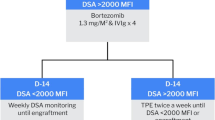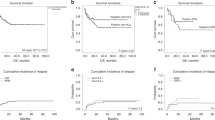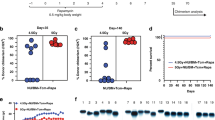Abstract
Summary:
It has been reported that in allogeneic stem cell transplantation, the mannan-binding lectin (MBL) status of the donor has prognostic value for the recipient. Two MBL-deficient patients, with coexisting haematological malignancy, were identified who were treated with bone marrow from donors with normal MBL concentrations. Although both patients engrafted successfully and remain in complete remission, neither seroconverted to the MBL sufficiency status of his donor over a follow-up period exceeding 2 years. This does not support the concept of MBL replacement by stem cell therapy, and does not provide an explanation for high MBL concentrations in stem cell donors protecting recipients from post transplant infections.
This is a preview of subscription content, access via your institution
Access options
Subscribe to this journal
Receive 12 print issues and online access
$259.00 per year
only $21.58 per issue
Buy this article
- Purchase on Springer Link
- Instant access to full article PDF
Prices may be subject to local taxes which are calculated during checkout
Similar content being viewed by others
References
Kilpatrick DC . Mannan-binding lectin: clinical significance and applications. Biochim Biophys Acta 2002; 1572: 401–413.
Kilpatrick DC . Mannan-binding lectin and its role in innate immunity. Transfus Med 2002; 12: 335–352.
Turner MW . The role of mannose-binding lectin in health and disease. Mol Immunol 2003; 40: 423–429.
Valdimarsson H, Vikingsdottir T, Bang P et al. Human plasma-derived mannose-binding lectin: a phase I safety and pharmacokinetic study. Scand J Immunol 2004; 59: 97–102.
Jensenius JC, Jensen PH, McGuire K et al. Recombinant mannan-binding lectin (MBL) for therapy. Biochem Soc Trans 2003; 31: 763–767.
Mullighan CG, Heatley S, Doherty K et al. Mannose binding lectin gene polymorphisms are associated with major infection following allogeneic hemopoietic stem cell transplantation. Blood 2002; 99: 3524–3529.
Mullighan CG, Bardy PG . Mannose-binding lectin and infection following allogeneic hemopoietic stem cell transplantation. Leukemia Lymphoma 2004; 45: 247–256.
Downing I, Koch C, Kilpatrick DC . Immature dendritic cells possess a sugar-sensitive receptor for human mannan-binding lectin. Immunology 2003; 109: 360–364.
Kilpatrick DC, McLintock LA, Allan EK et al. No strong relationship between mannan-binding lectin or plasma ficolins and chemotherapy-related infections. Clin Exp Immunol 2003; 134: 279–284.
Kilpatrick DC . Mannan binding protein in sera positive for rheumatoid factor. Br J Rheumatol 1997; 36: 207–209.
Author information
Authors and Affiliations
Corresponding author
Rights and permissions
About this article
Cite this article
Kilpatrick, D., Stewart, K., Allan, E. et al. Successful haemopoietic stem cell transplantation does not correct mannan-binding lectin deficiency. Bone Marrow Transplant 35, 179–181 (2005). https://doi.org/10.1038/sj.bmt.1704746
Received:
Accepted:
Published:
Issue Date:
DOI: https://doi.org/10.1038/sj.bmt.1704746
Keywords
This article is cited by
-
Low pre-transplant levels of mannose-binding lectin are associated with viral infections and mortality after haematopoietic allogeneic stem cell transplantation
BMC Immunology (2019)
-
Mannose-binding lectin gene variants and infections in patients receiving autologous stem cell transplantation
BMC Immunology (2014)
-
Mannose-binding lectin levels and infections in children after allogeneic hematopoietic SCT
Bone Marrow Transplantation (2010)
-
Influence of mannose-binding lectin genotypes and serostatus in allo-SCT: analysis of 131 recipients and donors
Bone Marrow Transplantation (2010)



